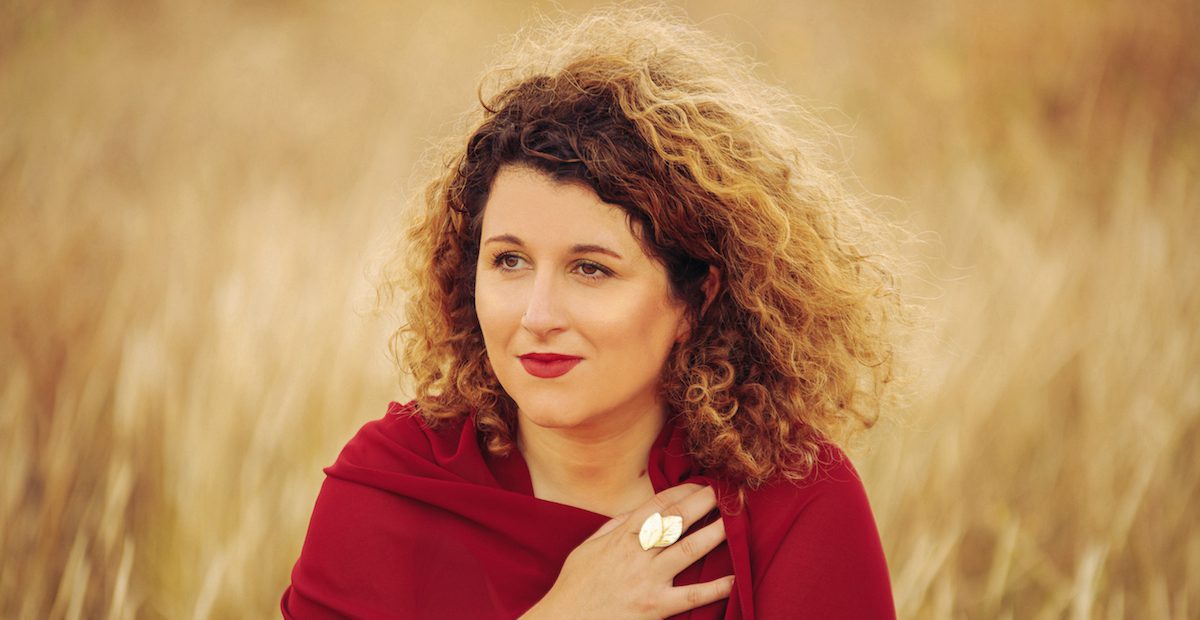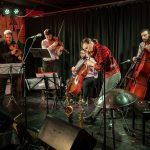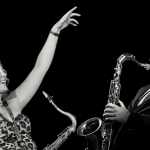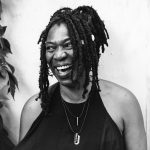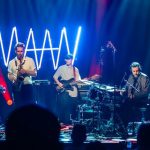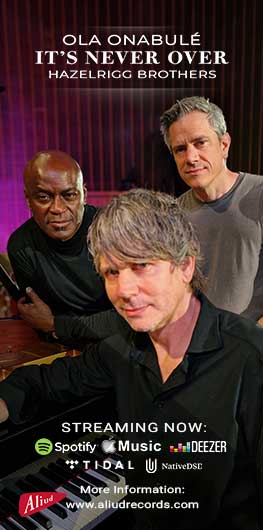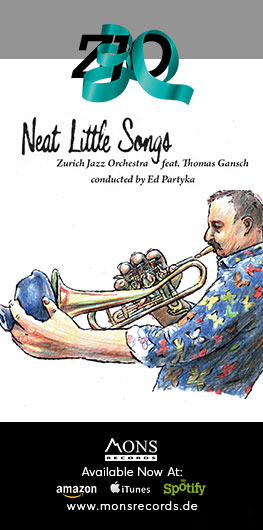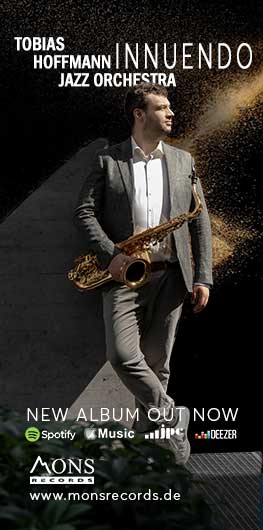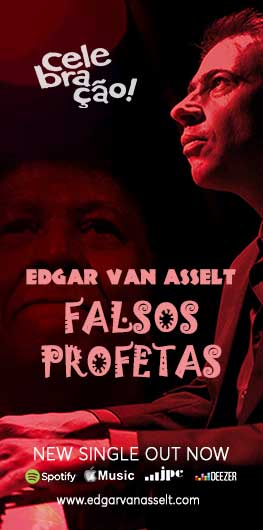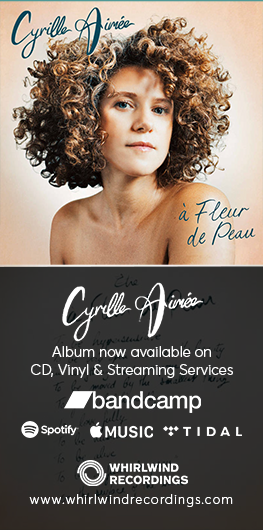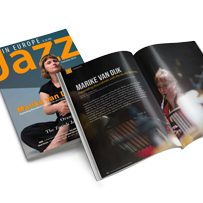As an eclectic artist and listener, I get always very enthusiastic when I come across new music whose genre I can’t define. In particular, I get very excited when I recognize some of my influences as well…and my curiosity begins to run wild. This is what happened when I listened to ‘ Sun’, the latest release from Lara Eidi, an artist born in Athens to Lebanese Canadian parents. Multi-instrumentalist, storyteller, singer, composer and also a freelance music journalist, workshop leader and educator…the list of Lara’s skills is long, as has been her music career.
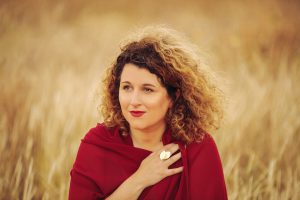
Lara discovered music at an early age – playing the piano and singing – and started performing from the age of 11 with the Greek National Opera Productions. She earned a Masters in Jazz Voice Studies with distinction from the Guildhall School of Music and Drama in London and completed a Degree in English Literature at the University of St Andrews. She has performed in some of the most renowned London venues – from St Martins in the Field to the the Barbican, as well as Pizza Express Dean Street and the London Jazz Festival, to name but a few – but also internationally, from her hometown of Athens to the Beirut International Festival. On stage, Lara doesn’t only sing but also plays the piano, the guitar and leads entire bands. Whilst collaborating with some of London’s acclaimed musicians across the jazz and folk scenes, she has self-released two EPs (‘Little People‘ and ‘Tell It Like It Is’) and, during the pandemic, launched and founded her own teaching platform, “Phonica Music Coaching”, through which she shares the important message of healing through music. This is also the essence of her music. All this wealth of experience converges into her album ‘Sun’, which incorporates Lara’s many talents as composer, musicians, singer and arranger, through stories of hope and empowerment.
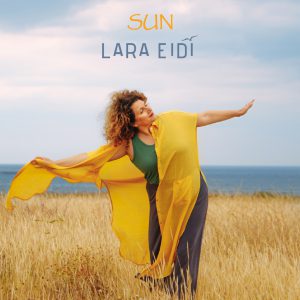 The liner notes to ‘Sun’ were written by the Award winning jazz artist, writer, Recording Academy Voting member and our very own Women In Jazz Media Chief Fiona Ross. She writes: ”Music is an omnipotent tool. It has the potential to strengthen and empower. To bring light where there is dark. To calm the mind and soothe the soul. But these almost magical moments of connectivity can only be realised if placed in the right hands. Lara Eidi. Is those hands”.’ “Lara Eidi is an artist that thrives on being different, with a voice that’s clearly a gift “( Sandy Brown Jazz); I couldn’t be more curious to ask her about ‘Sun’ and its creation.
The liner notes to ‘Sun’ were written by the Award winning jazz artist, writer, Recording Academy Voting member and our very own Women In Jazz Media Chief Fiona Ross. She writes: ”Music is an omnipotent tool. It has the potential to strengthen and empower. To bring light where there is dark. To calm the mind and soothe the soul. But these almost magical moments of connectivity can only be realised if placed in the right hands. Lara Eidi. Is those hands”.’ “Lara Eidi is an artist that thrives on being different, with a voice that’s clearly a gift “( Sandy Brown Jazz); I couldn’t be more curious to ask her about ‘Sun’ and its creation.
As a singer/ multi-instrumentalist with plenty of studio recording and live experience, with your latest album ‘Sun’, you’ve decided to take the lead not only as a vocalist but also as an arranger for every single track of the album. Talk us through the artistic process that brought you to such conceive such a ‘musically ambitious’ project, as you’ve described it.
I love talking about the process, it’s the most revealing and humbling affair known to any musician! To start with, I’ve actually always taken on the role of vocalist, instrumentalist and arranger as I’ve always found it best that I write songs which I can arrange for me to perform in their simplest form. What I wanted to do with ‘Sun’ was shift from my usual format of three instruments and tons of vocals (guitar, piano, cello and voice as I had with my first two Ep’s ‘Little People‘ and ‘Tell It Like It Is’) to a huge and bold sound. Deciding which songs would culminate in ‘Sun’ was fascinating as a process; interestingly enough they were a collection of old ones I never released, like ‘Forgive’, ‘Tide’, to ones I performed as a solo artist in London, ‘Damien’, ‘Hang On’, to ones I had written over the last three years like ‘Breathe Love’, ‘Hello Gravity’ and ‘Maybe Then’. I wanted the sound to musically include a rhythm section of bass, drums, piano and guitar, with a string trio that could sound like an orchestra. I dream big. I knew once I had found the incredible musicians featured on my album, I had to find a producer who knew me well enough musically to help me re-define my sound. Enter Giotis Parskevaidis, my old band mate and now a sought after producer in Athens. Together, I played every single voice you hear on the record into my trusty Korg Synth 2, and with his grace and expertise he put that to paper, with a few tweaks to help me bring the sound to life.
This is why each track on the album sounds different, although part of the same concert embodied all the possible colours of the ‘Sun’ so to speak. I didn’t want to make an album that ‘sounded’ like something familiar; I wanted to finally, almost declare my sound to the world, a sound that could be shared, embraced and felt by as many people as possible. And I managed to do all that with musicians I barely knew who completely trusted me, in a city that I used to call home, and still was trying to connect to. Talk about being an optimist! The result was pure joy.
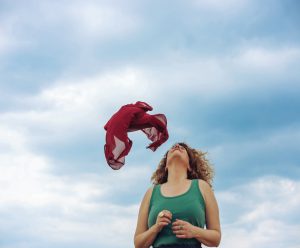
Entering the studio as an instrumentalist first with awesome Petros on drums and Harrys on bass, I had to forget I was a singer and just focus on the music. I remembered why piano was my first instrument and refuge. In that moment, I felt it with ‘Forgive’, as we recorded that crazy rhythm change live, layering vocals later, and thought: this is how music is meant to be enjoyed with musicians – felt, not analysed. As for the string players, the Lagom Quartet, they played like a world-class orchestra, and I was able to introduce counter melodies I had always sung as a singer, creating the sort of soundscape one would expect with a cinematic soundtrack. Lastly, I had 8 days of vocal tracks, aiming for two songs and around a million harmonies a day. That was it for me, I cried, laughed, reflected all at the same time I was finally home, in a place I could feel myself in the music. Finally, I invited long-time friend and cellist Stavros Parginos, who helped me arrange ‘Sun’ and Maybe Then’. I could go on and on about the sleepless night I spent heading to my piano, dreaming up new arrangements, but instead I’ll end with this: I learned a lot from this process. I learnt to let go and surrender to songs, the way you would a relationship. I let them do their thing and, in the end, they found me.
You mentioned the Lagom Quartet and the decision of arranging for a string section; this can be quite challenging. Even if this wasn’t the first time you’ve done this, how different was it on this occasion to arrange for a bigger ensemble
When I started out as a songwriter, it was as a duo with long-time friend and collaborator cellist Stavros Parginos. The beautiful thing about Stavros is his ability to approach music as an improvising musician. So, together, with his loop pedals and my vocal loop pedals, an old Nord and tons of effects we created a full band sound. It was Stavros who convinced me to seek a string trio, knowing that having people play the harmonies in real time would make a difference, and it worked so beautifully.
I invited Catherine, Tasos and Irini whom I had heard at their Lagom Quartet debut concert, to listen to my music when it was in pre-production format and they were immediately onboard. When I look back at the behind-the-scenes footage of ‘Sun’ filmed by Christos Britos, I think that was the most fun session in the recording process. Between conducting them, a zillion coffees later I had to pinch myself that these three people managed to record 6 songs in one session, even with the overdubs. I remember Stavros who joined the session looked over and smiled, and I knew he was thinking the same thing. We had come a long way together as a team, and finally, my music had embraced a bigger depth than I could have hoped for, with these orchestral musicians giving the kind of heart and soul that comes so rarely.
There are a lot of beautiful vocal layers and harmonies in the album that really highlight important moments of your songs. You’ve said before that you ‘wrote these harmonies imagining for a moment you were back in London and had 10 singers in the same room’. How long did this creative process take you and could you already hear the ideas in your mind before having them on paper?
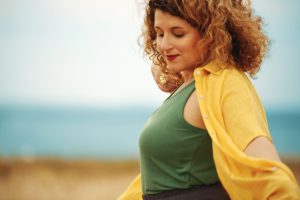 Thanks so much. That’s a great question. With ‘Hang On’ for example, back in London, I had invited singers Kate Smith, Chiara Zurlo and Angela Tursi to guest on it at a huge performance I put together with Dave Manington and Naadia Sheriff at Christ Church. Hearing those singers create sliding dynamics and almost pan-like echoes, in a church no less, really moved me and I knew I wanted to replicate that in my album.
Thanks so much. That’s a great question. With ‘Hang On’ for example, back in London, I had invited singers Kate Smith, Chiara Zurlo and Angela Tursi to guest on it at a huge performance I put together with Dave Manington and Naadia Sheriff at Christ Church. Hearing those singers create sliding dynamics and almost pan-like echoes, in a church no less, really moved me and I knew I wanted to replicate that in my album.
As I keep mentioning, this record was made possible by the generosity of my friends, family, and supporters through my crowdfunding campaign, so I had to work with what I had. I asked a singer friend to help me with the vocals, but was urged to record them myself. She was right. It was just something I had to do, as I remembered that being a singer for me was more than just performing. When I started to sing as a young kid, first at a classical conservatory, I remember never wanting to sing the lead, but was always happy to sing the multiple parts of a piece. So, it only made sense that for three months, listening back to the rehearsals, and demos, I started to record one layer at a time. Even when it came time for me to record the vocals, Giotis knew I’d have more ideas on the day. I felt free, happy, and was able to give myself completely to the music. Through this, I hope I’m able to offer the listener that feeling of embracing every single emotion they can feel through each voice, so to speak.
The Covid pandemic marked a turning point for you as an artist, leading you to work on the music for ‘Sun’; can you tell us a little more about what happened?
I noticed, throughout the pandemic and when it finally lifted, that a lot of artists had left the industry. And I knew why. It’s one of the most demanding, confusing, and chaotic industries I can think of. What I realized on a personal level, is that being back in Athens, away from the city I called a second home for so long and to which had practically defined my career, in London, I left behind a piece of myself that made me feel alive and active. I knew the world wouldn’t go back to normal, even in 2020. I knew that I felt isolated and afraid of the changes that were ahead, and I realized it came from a deep, dark place of fear; fear to take a step back and take a break from it all. I had spent so many years working hard, like so many, building my craft, and everything that goes with it, I rarely took a moment to appreciate everything I had done. I also realized my anxiety had become so huge, it felt almost like it was a crutch to lean on to push me to work harder. So, I realized that if I wanted to turn away from fear of failure, I had to embrace it (‘Hello Gravity’, for instance is about going on even when fear wants to bring you down). I had to look within myself to remind myself that the Universe has other plans, and I had to listen.
That’s what ‘Sun’ is about. It’s about recreating the past, to look to the future. It’s about finding that ‘Sun’ within oneself, rather than frantically trying to fix things on the outside. It’s about finding light where there is dark and knowing that truly this is what life is really all about. I’m lucky that music, this album, healed me in so many ways and helped me accept that I no longer wanted to surrender to my anxiety. Instead, I wanted to return to a state of calm, free from things that no longer served me. And for that, I am grateful, as I wasn’t alone in this.
Someone defined your first single “Breathe Love” as “a jazz-folk remedy for modern malady”. It seems like the healing power of music through storytelling has motivated you not only during the making of ‘Sun’ but also throughout the majority of your career. Can you talk to us in detail about your vision of music as a healing channel?
I will always try to make sense of the world through the music, I’ll always try to heal myself through music and hopefully heal other people. When you listen to ‘Breath love’, the words are about that: breath love so you can give love.
Music is truly a vehicle to which, used lovingly, can unite, heal, and lift spirits. So do stories. As a songwriter, I feel inclined to do both. Almost every song I’ve written is a story that lends itself to the listener, the more personal the song, the more universal the message. It’s a kind of catharsis, song writing, as well as performing. I often tell my students that the voice is the most vulnerable of all instruments because it’s a direct extension of one’s words, feelings, character, everything! So, once we understand that we’re not exposing ourselves, but rather we’re bearing our souls to the world, one note at a time, one understands the power that can have on a mass scale. If a singer is having a rough day and is tired, the voice is affected. Same for a pianist, you feel and hear what they go through with the way they play. Musicians express what something feels like, through sound, and through story. Throughout every world crisis, event, or with every emotional experience, music is always there to remind us of overcoming obstacles in life. It also finds its way to celebrate moments of joy. Let’s also not forget, most recently, how many people turned to music to help them feel connected during the pandemic.
To find my own connection to this kind of almost heavenly feeling of connectedness, I often turn to nature to ‘listen’ to the sounds of the earth. Waves, streams, brooks; water is interchangeable, and it inspires freedom. A gentle breeze, birdsong, and sometimes the sounds of silence, remind me of the little beauty that we have left on Earth. Music, I feel, is the connecting thread between two worlds: the world we wish to live in, and the world we find ourselves in.
Your music covers a wide range of genres; I definitely hear some jazz and folk influences (…I’m curious to know if you are a Jeff Buckley fan like me as I hear a lot of his music in the intro to “Tide”) but it feels to me – and journalist Fiona Ross mentioned this in her liner notes of the album – that there’s more than this. Which are the artists that most inspired as a song-writer and musician?
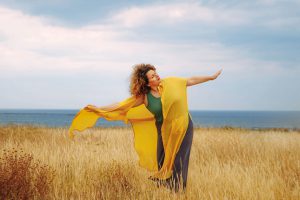 Oh wow, Jeff Buckley, eh? How cool! Well, with particular reference to ‘Tide’, one of the first songs I’d ever written, I had actually just finished listening to a cassette of Crosby Stills Nash’s Suite Judy Blue Eyes ‘Deja Vu’ with my dad, who influenced my musical ears from an early age. I never actually released ‘Tide’ until now except for an acoustic version I recorded in my room, fourteen years ago on Soundcloud! (laughs)
Oh wow, Jeff Buckley, eh? How cool! Well, with particular reference to ‘Tide’, one of the first songs I’d ever written, I had actually just finished listening to a cassette of Crosby Stills Nash’s Suite Judy Blue Eyes ‘Deja Vu’ with my dad, who influenced my musical ears from an early age. I never actually released ‘Tide’ until now except for an acoustic version I recorded in my room, fourteen years ago on Soundcloud! (laughs)
I grew up in a multicultural household, born in Athens to Lebanese- Palestinian-Canadian parents. My parents are both highly artistic, and I owe my love of folk-rock and song writing to them, listening to Joni Mitchell, Melanie Safka, Pink Floyd, Jethro Tull, Traffic. I owe it to my grandmother for introducing me to my first jazz singer (Nina Simone) sitting on her terrace, followed by my grandfather insisting I listen to Fairuz and Oum Khaltoum. So I started by literally listening to the people before my time, and when I became a teenager and had my first band, I then discovered that the 90’s were actually pretty awesome. Imogen Heap, Jeff Buckley, Alanis Morisette. Later on I found my way back to classical music (I had trained as a classical pianist before switching to pop and folk music), and really appreciated classical composers of old and ones that defined cinema, like Ennio Morricone and Howard Shore. My uncle, Billy Eidi, who is a classical pianist made me appreciate Debussy, and so as you can see, I practically am a result of all of those artists, because I found that they all shared one thing in common: they had their own unique style, and constantly evolved as artists, each weaving their own unique sonic tapestry. Even as a music student, I could find myself blasting Nirvana, Vince Mendoza and Fiona Apple in one day, and be celebrating their original sounds.
Funnily enough, although attending Guildhall was a blessing, all my training as a jazz musician didn’t come from it but from playing with exceptionally talented – in the scene – jazz musicians. That’s how I learned: I learned to scat listening to musicians and I got my jazz education from performing. Guildhall really challenged me in ways that almost made me forget my own voice as an artist. So, when I graduated, I found that I owed it to myself to sing, compose and play whatever I felt like, as long as it was authentic.
Hope, empowerment, and freedom are some of the messages embodied in ‘Sun’. How empowered and free do you feel as a woman in the music business?
Oh lala… This is a whole other interview (laughs) but I will try and answer as concisely as I can. Hope is a sign of empowerment, and there is freedom in both. As long as we remind ourselves that these co-exist, then we can as people, not just as women, continue to make a difference. I believe in equality, but I also believe in fair representation. ‘Sun’ is about embracing every single part of ourselves as humans, and in my case, as a woman, that makes us, well, who we are. The times I don’t feel like I’m doing that, are the times that I feel threatened by others, and not just men by the way, that my own place in this crazy industry doesn’t hold. All I need to do is to remember those who support and lift us up. As far as the music business goes, I’d say that I feel that I have to keep reminding myself that I do this for the music, for the love of music, and for sharing the love of music. Unfortunately, this business has shed light on everything other than the music lately. Nowadays, as a journalist for instance, even working on other people’s music, I’m flooded with TikTok, Spotify and streaming numbers, and an incessant need to post about everything other than the music. It’s confusing. I also feel that there’s a huge amount of pressure still on women to do more, as whenever a record comes out that’s male fronted, people don’t react to the posts, pictures, behind the scenes- there’s still more focus on the music. Till that changes, I don’t think we’ll ever feel completely empowered.
What’s happening after ‘Sun’? What are your next artistic projects and collaboration?
Honestly? I’m going to enjoy ‘Sun’ for as long as possible. For the moment, I’ve decided to pause performances, until I take the time to recuperate and focus on my goal to take this album on tour, far and wide. As for collaboration: I can’t wait for more to come. I can say that I hope to return to a particular French city soon to continue working on something instrumental.
Way ahead in the future, I’d love to write an instrumental new album for piano, cello and maybe a cappella voice. In relation to ‘Sun’, the very last track ‘Maybe then’ (which is probably the one I feel most moved by as I’ve never done anything like) could be seen as a kind of preview into what my next work could be.
Photos by by Valeria Iaseva
Lara’s new album “Sun” is out now. Listen here
Discover more about Lara’s music here
Last modified: September 27, 2023


